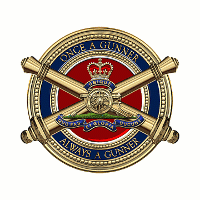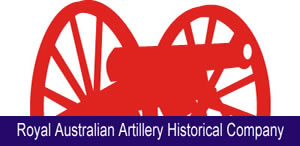On 17th August 2007, many members of the Royal Regiment of Australian Artillery gathered amongst a full St Stephen's Cathedral in Brisbane to thank God for the life of Lieutenant Colonel Denis Anthony Casey. This is a Gunner's tribute to that officer and I thank the following for their input: Ivan Clark, John Casey, Paul Stevens, Bob Carson, Keith van den Belt, Con Lucey, Maurie McGuire, Rob Collins, Mick Crawford, Dick Wickenden, John Bertram, Gerry Dekker, Michael Paramor and Gerry Salom.
Lieutenant Colonel Casey was born on 27th June 1940 and spent the early years of his life at an advisedly safe distance from the Second World War with his family in Herberton on the Atherton Tablelands. With his four siblings, the family moved to the Toowoomba area after the war. Though a skilled milker of cows, he completed school at Downlands College then became an apprentice electrician with the Brisbane City Council. On graduation, he married Muriel and then joined the Citizen Military Forces (CMF) at 11th Field Regiment located in Annerley, Brisbane on 1st May 1962. This logical, considerate and premeditated progression illustrates trade mark traits of Lieutenant Colonel Denis Casey.
In those days, merit was rewarded in the CMF and he rose quickly through the ranks. Though senior non commissioned officers were needed, this bloke was officer material - he took only 18 months to be commissioned through unit coaching on 2nd November 1963. He became renounced for his good and mischievous humour and great story telling. Perhaps the most widely spread ‘Casey anecdote’ of this time was at Tin Can Bay when he was on a trip to an observation post perched up on top of gear in the back of fellow officer Con Lucey's Austin Champ. Champs were known for their remarkably soft suspension and when the vehicle bounded over a rock, he was launched upwards and outwards, landing flat on his back. Con believed he had 'contributed to Denis' early demise', but a lopsided smile appeared on the victim's face, he made a quick quip about lousy drivers and climbed back on board.
Lieutenant Colonel Casey enjoyed ceremonies and rituals and with two brothers in the clergy, he had plenty of exposure. However, from Gunner Casey's earliest days in the CMF, then Sergeant Maurie McGuire recalls that he was always toying with a desire to join the Regular Army. An opportunity to undertake full-time service came in 1967 when 1st Field Regiment was reforming at Wacol after returning from its first tour of Vietnam. For the next ten months, Lieutenant Casey felt his way in the Regular Army and in July 1968 was commissioned into the Australian Staff Corps.
His early appointments centred on assistant adjutant to Dick Wickenden and gun position officer of 101st Field Battery. He attended a forward observer's course, but went to Vietnam as the assistant adjutant on 25th February 1969. Dick recalls that for the first couple of months, Lieutenant Colonel Casey was with the forward Artillery Tactical Headquarters up at Long Binh (northeast of Saigon) as a duty officer. 105th Field Battery was in the same fire support base (Kerry) and members frequently either saw him or heard of his humour. By mid year, there was a vacancy for a forward observer captain with the 105th and Lieutenant Casey was promoted to captain to fill this appointment. He joined Major Reg Sutton's A Company of 5th Battalion Royal Australian Regiment and, much to Reg's delight, was an accomplished 500 card player. The pair was a perfect complement - laid back, easy going, but quite professional. Captain Casey demonstrated exceptional composure under fire. In combat situations, he could always be relied upon for a calming quip - in that quiet drawl of his - whenever others were stressed and the radio net became a little overheated.
A Company had its share of action in Vietnam and he trained a fine team. His assistant (ack), Bombardier Gerry Dekker thoroughly enjoyed the free rein he was given, but knew that his boss was always there to back him up when required. (Gerry was awarded the Military Medal for his actions during this posting.) A very strong bond developed within the team. When the 105th completed its tour of duty, Captain Casey returned to Australia with them on 4th February 1970 and became the battery's administrative commander on and off throughout the remainder of that year.
Posted to Townsville in 1971, he was appointed adjutant of 4th Field Regiment RAA in September. Then commanding officer Gerry Salom described him as 'hard working, keen to learn and very loyal'. When Cyclone Althea struck on Christmas Eve that year, he demonstrated excellent skills in coordinating the activities of the unit to help the local community in this time of crises.
The next posting was right across the country to Perth where he became adjutant of 3rd Field Regiment, a CMF unit. There he was able to combine his Regular Army experience with his CMF background and was a true asset to the unit. After a short period with Headquarters 2nd Task Force, he moved to the School of Artillery and was promoted to major and appointed as the senior instructor of the Regimental Training Wing. Twelve months later, he became the School's Major Administration. The Chief Instructor at the time, Mick Crawford said that he will always remember Major Casey for his excellent technical skills and high standards as a senior instructor and for his loyalty and the life that he brought back into the Mess. The Officers' Mess was never dull with John Jansen, John Phillips and Tim Griggs also on the staff, but it was his story telling enthralled the younger officers in the Blue Room each evening. It was also not uncommon for practical jokes and harmless mischief to spread across the School, however, Michael Paramor remembers 'the way he treated us with such kindness and made it such fun' to be at the School.
| |
|
|
| |
|
|
| |
 |
|
| |
|
|
| |
|
|
In 1978, Major Casey attended the Australian Staff College at Fort Queenscliff, Victoria. This was the start of many great friendships which grew even stronger over the years since. Fellow student Ivan Clark fondly remembers 'his great talent for observational humour and forensic wit'. Whether it was sailing on Port Phillip Bay, flying across Australia in a Hercules aircraft, dining in student friends' homes or the Mess, standing at a pub in Broome, 'or even sitting in those silly collapsible Army chairs discussing the military problems of the world, he would engage - and every moment was special.'
Major Casey returned to Brisbane in 1979 and after a year as a logistics staff officer at Headquarters 1st Military District, returned to the Gunner fold as the equivalent of the Brigade Major Royal Artillery on Headquarters 1st Division Artillery at Enoggera. Here he worked intimately with Lieutenant Colonel Ken Mackenzie on the mammoth tasks of justifying ammunition for Royal Australian Artillery training and spreading the load for support to the School of Artillery across the division. Ken admired his thorough professionalism and attention to detail which were essential in a position responsible for assessing Artillery standards throughout the division. Ken was posted at the end of 1980 and Major Casey was promoted to lieutenant colonel and took up the staff officer grade one appointment.
The old sense of humour was alive and well - his mythical Lieutenant R. Buckle who was held responsible for many practical jokes throughout the headquarters, and in conjunction with his fellow staff college classmate Adrian D'Hage, the great paper plane competition. Ivan Clark admired the Casey style in the Mess. 'If you saw Denis coming over to join your group, you would feel, ‘You beauty! We can relax and enjoy ourselves in his company.’ If you were around Denis, life and work were that little bit more enjoyable and rewarding.'
In 1984, Lieutenant Colonel Casey was selected for service with the United Nations Military Observer Group, India and Pakistan and posted to Kashmir. Here he did his best to make a positive difference in a difficult situation. The stories of his experiences as a UN observer in the cease-fire zone between India and Pakistan demonstrated his total military professionalism and diplomatic skills and often equalled the much accoladed adventures of Gunner Spike Milligan during the Second World War.
On return to Australia, he attended the Joint Services Staff College and was then posted to the RAAF School of Languages to study Thai. It was proposed that he would become the military attaché in Thailand, but since his hearing had deteriorated beyond a level with which he felt comfortable, Denis decided to separate from the service. After a brief time at Headquarters Field Force Command in Sydney, he left the Army in 1987 having completed 20 years full-time service. He returned to Brisbane.
Back in civvy street, Mr Casey turned his mind to human resources and worked for the Institute of Engineers, the Brisbane City Council and Q-Build. However, it was his final job as a court officer in the Federal Courts that he really came into his element. Ivan Clark was a great fan of the ‘catalogue of stories with an eye for the foibles of human nature on both sides of the bench’ which Denis developed in this appointment. In later years, he was also an active legatee with the War Widows of the Gaythorne Group of Brisbane Legacy.
Dr John Casey described how 'Denis always had an easy relationship with the church', no doubt fostered by his brothers - Fathers Dermott and Peter. He was a very Christian person and throughout the 1990s, was president of the Catholic Ex-Servicemen's Association, their representative on the ANZAC Day Commemoration Committee of Queensland and responsible for the organisational aspects of the ANZAC Day service in St Stephen's Cathedral. It was therefore most fitting that Denis' life should be celebrated by some 250 of his family and friends in that cathedral under the watchful eye of the archbishop, one other bishop and some 12 finely robed church clergy.
Another laudable attribute of this man was his love of, and dedication to his fellow Army mates. Though severely limited in his mobility for the last 12 months, he struggled valiantly and made three significant final public appearances - the December 2006 Retired Gunner Officers Luncheon at Victoria Barracks, a May 2007 staff college reunion at the United Service Club, and the June 2007 annual Binh Ba Day Luncheon with a 105th Battery group at the traditional Vietnamese restaurant in West End. Each of these was a major struggle for him, but the old traits were there - observant, entertaining and topical. In his own quiet way, Denis paid his Army mates the supreme compliment by making this round of engagements to say 'goodbye'. The Army influence was prominent at his cathedral service - a Regimental flag draped the casket, his medals, sword and cap were the pall and the congregation seemed to have bemedalled mates in almost every row. At the crematorium, a uniformed bugler played the Digger's ultimate farewell - Last Post followed by Rouse. In between, all present gave a special emphasis when repeating the final words of the Ode - 'We will remember them.'
Six years ago, Denis suffered a heart muscle myopathy which left him with a terminally deteriorating condition. He was given a prognosis of three years but beat these odds by another three. He lost his hair through chemotherapy, but never his spirit and sense of humour. Muriel, whom he loved so much, cared for him selflessly throughout this time. This devotion extended through the last two weeks of palliative care at home with his immediate family. Denis passed away peacefully with Muriel by his side just before midnight on 12th August 2007.
|






